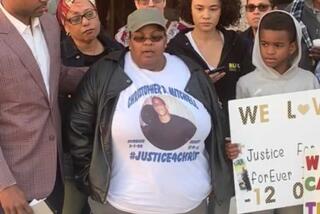Mistakes by Bomb Victims Not Relevant, Judge Rules
- Share via
The judge in the Donald L. Morse bomb-blast trial dealt the defense a sharp blow Thursday by refusing to allow an explosives expert to testify that the best way to handle the pipe bomb that killed two police officers at Morse’s home was to detonate it at a safe location.
The two members of the Los Angeles Police Department’s bomb squad were killed while dismantling the bomb, one of two that they found in Morse’s North Hollywood garage.
The 39-year-old Morse, a motion picture and television makeup artist, is charged with two counts of murder and two counts of possessing explosives in the Feb. 8, 1986, explosion.
Morse told police that he had never seen the bomb before. Defense attorney Bernard J. Rosen has argued that even if jurors think it was Morse’s bomb, the officers caused their own deaths by failing to explode the bomb at another site or to wear protective clothing.
‘Designed to Kill’
Deputy Dist. Atty. Sterling E. Norris has countered: “Mr. Morse possessed the bomb, and the bomb was designed to kill somebody, and that rules out any defense based on the officers’ negligence.”
On Thursday, San Fernando Superior Court Judge John H. Major sided with the prosecution. He rejected Rosen’s efforts to bring an expert witness to the stand to testify that the dead officers, in Rosen’s words, “might not have used the best method to handle the bomb, and certainly not the only method.”
Major ruled that the actions of the victims, Detective Arleigh McCree, 46, and Officer Ronald Ball, 43, are not relevant. Under state law, “only when the victim’s negligence is the sole cause of the death is the defendant relieved of culpability,” he said.
The construction and possession of an illegal, deadly weapon, such as the bomb, was at least a contributing cause of the deaths, Major ruled.
The judge used the same reasoning for disallowing testimony from two of Morse’s Vanscoy Avenue neighbors.
Both testified that they overheard McCree tell a fellow officer that he and Ball already had dismantled one bomb and that the second would be “a piece of cake.”
Rosen argued in vain that McCree’s statement “shows that nothing Mr. Morse did or could have done caused those deaths. And the prosecution must prove that my client caused those deaths.”
Norris argued that in addition to being hearsay evidence and irrelevant to the case, McCree’s remark “could have been something he said to calm the public.”
Major also ruled out evidence aimed at discrediting testimony for the prosecution by William H. Enoch, Morse’s former brother-in-law.
Enoch, who has been embroiled in a three-year custody dispute with the defendant’s sister, Ernestine, testified that Morse threatened to blow him up two weeks before the officers were killed in Morse’s garage.
Rosen wanted to introduce evidence that Enoch recently violated a California court order by taking the couple’s three children out of state, apparently to North Carolina.
But Major ruled that although a warrant has been issued for Enoch’s arrest, the custody-order violation occurred more than two years after Enoch reported the bomb threat to police and “thus can’t be connected to this case.”
Rosen acknowledged that Major’s rulings were a setback. But he said that “if the jury does not interpret the evidence that they do get to hear as I hope they will interpret it, then we have a strong basis for an appeal.”
Other defense witnesses have been chipping away at the credibility of prosecution witnesses.
Al Ward, a prosecution witness, testified earlier that Morse had bragged to him, “I know how to build a bomb,” and had shown him a copy of “The Anarchist Cookbook,” which tells how to make bombs.
Attended Birthday Party
Ward, who said he and his wife were close friends and neighbors of the Morse family, testified that he was certain the conversation occurred in 1982 or 1983 because it was before the Morses separated and before he attended a birthday party for the Morses’ son.
But ex-wife Gloria Morse said Thursday that she and the defendant broke up in 1980 and that they had only one birthday party for their son, in 1978.
And a Los Angeles police bomb expert called to the stand by Rosen acknowledged that “The Anarchist Cookbook” does not discuss either the detonation device or the type of blasting powder used in the bomb that killed the two officers.
Police testified that they went to Morse’s home to search for a pistol that had been used four days earlier to shoot an official of the Makeup Artists and Hairstylists Union Local 706, of which Morse was a member. The gun was not found, and Morse has not been charged in the shooting.
A critical part of the prosecution’s case is police testimony that a can of blasting powder, identical to that used in the two bombs, was found inside a coffee can in the Morse kitchen.
Both cans had Morse’s fingerprints on them, experts testified.
Police also said they found shotgun shells similar to those used in the bombs at the Morse residence.
Morse, who could be sentenced to life in prison without the possibility of parole, has been in County Jail since the officers were killed.
More to Read
Sign up for Essential California
The most important California stories and recommendations in your inbox every morning.
You may occasionally receive promotional content from the Los Angeles Times.













